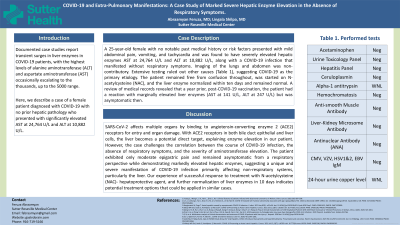Sunday Poster Session
Category: Liver
P1307 - COVID-19 and Extra-Pulmonary Manifestations: A Case Study of Marked Severe Hepatic Enzyme Elevation in the Absence of Respiratory Symptoms
Sunday, October 27, 2024
3:30 PM - 7:00 PM ET
Location: Exhibit Hall E

Has Audio

Feruza Abraamyan, MD
Sutter Health
Roseville, CA
Presenting Author(s)
Feruza Abraamyan, MD, Lingala Shilpa, MD
Sutter Health, Roseville, CA
Introduction: While reported case studies show transient surges in liver enzymes in COVID-19 patients, the highest levels of alanine aminotransferase (ALT) and aspartate aminotransferase (AST) are known to escalate up to the 5000 range. Here, we describe a female patient diagnosed with COVID-19 with no prior hepatic pathology who presented with much more significant elevation of AST and ALT.
Case Description/Methods: A 25-year-old female with no notable past medical history or risk factors presented with mild abdominal pain, vomiting, and tachycardia and was found to have severely elevated hepatic enzymes AST at 24,764 U/L and ALT at 10,882 U/L, along with a COVID-19 infection that manifested without respiratory symptoms. Imaging of the lungs and abdomen was non-contributory. Extensive testing ruled out other causes, suggesting COVID-19 as the primary etiology of highly elevated liver enzymes (negative acetaminophen and urine toxicology panel, negative hepatitis panel, negative tests for Ceruloplasmin, Alpha-1 antitrypsin, Cytomegalovirus IgM, Varicella Zoster virus IgM, Herpes Simplex Virus 1&2, Epstein-Barr virus IgM (with positive IgG), hemochromatosis wild genotype, negative anti-smooth muscle antibody, liver-kidney microsome antibody, and antinuclear antibody (ANA);24-hour urine copper level was within normal limits). The patient remained free from confusion throughout, was started on N-acetylcysteine (NAC), and the liver enzyme normalized within ten days and remained normal afterward.
Discussion: SARS-CoV-2 affects multiple organs by binding to angiotensin-converting enzyme 2 (ACE2) receptors for entry and organ damage. With ACE2 receptors in both bile duct epithelial and liver cells, the liver becomes a potential direct target, explaining enzyme elevation in our patient. However, the case challenges the correlation between the course of COVID-19 infection, the absence of respiratory symptoms, and the severity of aminotransferase elevation. The patient exhibited only moderate epigastric pain and remained asymptomatic from a respiratory perspective while demonstrating markedly elevated hepatic enzymes, suggesting a unique and severe manifestation of COVID-19 infection primarily affecting non-respiratory systems, particularly the liver. Our experience of successful response to treatment with N-acetylcysteine (NAC)- hepatoprotective agent, and further normalization of liver enzymes in 10 days indicates potential treatment options that could be applied in similar cases.
Disclosures:
Feruza Abraamyan, MD, Lingala Shilpa, MD. P1307 - COVID-19 and Extra-Pulmonary Manifestations: A Case Study of Marked Severe Hepatic Enzyme Elevation in the Absence of Respiratory Symptoms, ACG 2024 Annual Scientific Meeting Abstracts. Philadelphia, PA: American College of Gastroenterology.
Sutter Health, Roseville, CA
Introduction: While reported case studies show transient surges in liver enzymes in COVID-19 patients, the highest levels of alanine aminotransferase (ALT) and aspartate aminotransferase (AST) are known to escalate up to the 5000 range. Here, we describe a female patient diagnosed with COVID-19 with no prior hepatic pathology who presented with much more significant elevation of AST and ALT.
Case Description/Methods: A 25-year-old female with no notable past medical history or risk factors presented with mild abdominal pain, vomiting, and tachycardia and was found to have severely elevated hepatic enzymes AST at 24,764 U/L and ALT at 10,882 U/L, along with a COVID-19 infection that manifested without respiratory symptoms. Imaging of the lungs and abdomen was non-contributory. Extensive testing ruled out other causes, suggesting COVID-19 as the primary etiology of highly elevated liver enzymes (negative acetaminophen and urine toxicology panel, negative hepatitis panel, negative tests for Ceruloplasmin, Alpha-1 antitrypsin, Cytomegalovirus IgM, Varicella Zoster virus IgM, Herpes Simplex Virus 1&2, Epstein-Barr virus IgM (with positive IgG), hemochromatosis wild genotype, negative anti-smooth muscle antibody, liver-kidney microsome antibody, and antinuclear antibody (ANA);24-hour urine copper level was within normal limits). The patient remained free from confusion throughout, was started on N-acetylcysteine (NAC), and the liver enzyme normalized within ten days and remained normal afterward.
Discussion: SARS-CoV-2 affects multiple organs by binding to angiotensin-converting enzyme 2 (ACE2) receptors for entry and organ damage. With ACE2 receptors in both bile duct epithelial and liver cells, the liver becomes a potential direct target, explaining enzyme elevation in our patient. However, the case challenges the correlation between the course of COVID-19 infection, the absence of respiratory symptoms, and the severity of aminotransferase elevation. The patient exhibited only moderate epigastric pain and remained asymptomatic from a respiratory perspective while demonstrating markedly elevated hepatic enzymes, suggesting a unique and severe manifestation of COVID-19 infection primarily affecting non-respiratory systems, particularly the liver. Our experience of successful response to treatment with N-acetylcysteine (NAC)- hepatoprotective agent, and further normalization of liver enzymes in 10 days indicates potential treatment options that could be applied in similar cases.
Disclosures:
Feruza Abraamyan indicated no relevant financial relationships.
Lingala Shilpa indicated no relevant financial relationships.
Feruza Abraamyan, MD, Lingala Shilpa, MD. P1307 - COVID-19 and Extra-Pulmonary Manifestations: A Case Study of Marked Severe Hepatic Enzyme Elevation in the Absence of Respiratory Symptoms, ACG 2024 Annual Scientific Meeting Abstracts. Philadelphia, PA: American College of Gastroenterology.
